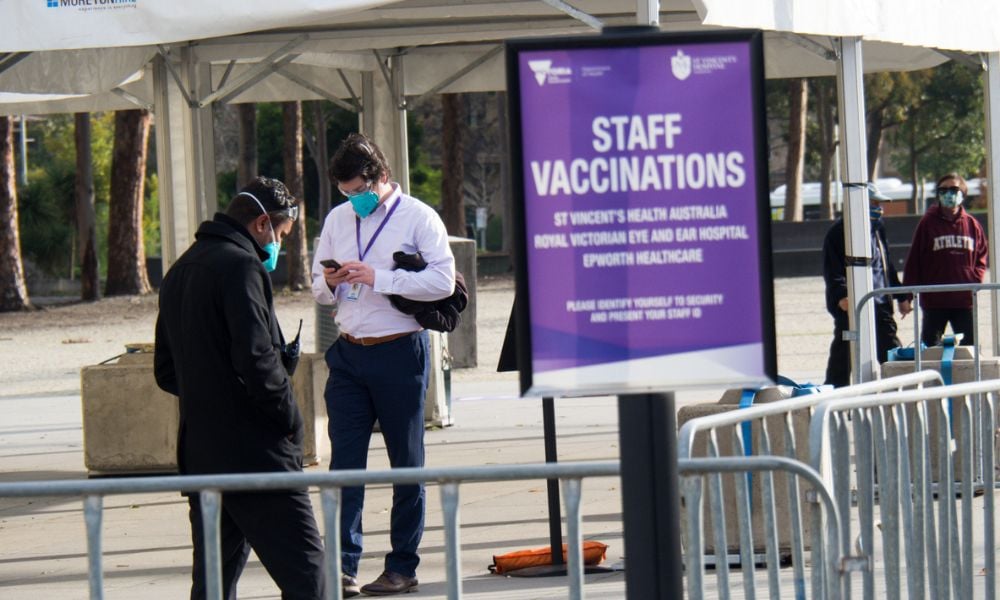The reasonableness of workplace vaccination policies may be waning, but that could change quickly

Summer is nearing its end, the school year is beginning, and — seemingly like clockwork over the past two-and-a-half years — there are warnings of another wave of COVID-19 rearing its ugly head. Government restrictions have mostly lifted, and most employers aren’t requiring the wearing of masks in their workplaces anymore.
But what about vaccination mandates?
As we entered the third year of the pandemic in 2022, many employers and people were ready to resume normal life as it seemed that COVID-19 cases were decreasing — although it’s hard to know by how much since many jurisdictions have stopped tracking and testing. A large proportion of the population is vaccinated, so is it time to turf mandatory vaccination in workplaces?
Once vaccines became widely available by mid-2021, governments encouraged employers to implement mandatory vaccination policies while enacting them for public workers. Some of these policies were challenged — particularly in unionized workplaces — with mixed results.
Recently, 20 workers for the City of Windsor launched a lawsuit against the municipality after they were fired for non-compliance with its vaccination policy. The policy, announced in September 2021, gave employees until Nov. 15 to provide proof of vaccination or a valid exemption under human rights legislation. One-hundred-and-four workers did not, and they were dismissed in January. The former employees are claiming: punitive damages of $250,000; $1,000 per day since March 1; and $50,000 in aggravated damages for mental distress — all for each employee — for what they call “illegal” actions that are “without due process.”
Reasonable policies
While the Windsor case involves going to court, arbitrators have been busy with union challenges of such policies. An industrial employer in Hamilton implemented a policy in late 2021 requiring all employees to be vaccinated, except for medical exemptions. The policy reflected that of the federally-regulated organization that owned the land upon which part of the facility sat. The arbitrator found that the vaccination requirement was a reasonable intrusion upon employee privacy due to the risk of exposure to employees in the facility and to the employer’s business if many employees fell ill.
In a decision out of B.C. earlier this year, an arbitrator found that BC Hydro’s vaccination mandate was reasonable – but the possibility of discipline for non-compliance was not. While the objectives of the mandate were reasonable — similar to the Hamilton case above, reducing the risk of exposure and illness for employees on the job — but a reference in the policy to potential discipline or termination for non-compliance went too far. The arbitrator said putting unvaccinated employees on unpaid leave until some future date when vaccines wouldn’t be mandatory posed no safety risk to the workplace or financial risk to the employer, the arbitrator said.
An Ontario company who contracted with long-term care homes to provide maintenance and cleaning workers informed its employees of vaccine mandates at the homes and indicated that if they didn’t comply, they wouldn’t be allowed to work. When unvaccinated employees were put on unpaid leave, the union grieved, arguing that the company didn’t have a vaccination policy of its own and should have put them on temporary layoff so they could collect EI benefits. An arbitrator disagreed, finding that the company’s management rights allowed them to conduct its business in accordance with its commitments, and by informing its employees of the client’s vaccination requirements, it essentially adopted their policies as its own. The employees’ choice to not get vaccinated did not apply to the collective agreement’s layoff provisions and it was reasonable to place employees who couldn’t work on an unpaid leave of absence, according to the arbitrator.
Not an OHS issue
While vaccination policies generally serve a health and safety purpose, occupational health and safety legislation is not the arena for employees to challenge them. Four City of Toronto workers discovered this when they filed a complaint under Ontario’s Occupational Health and Safety Act, which protects workers’ health records from employers and protects workers from reprisals for exercising their OHSA rights, after they were suspended for not providing proof of vaccination.
The Ontario Labour Relations Board said it was the wrong venue to challenge a vaccine mandate, as the protection of health records didn’t give workers “an unfettered right to refuse disclosure of information, free of any and all consequences.” In addition, the city’s vaccination policy and the consequences of non-compliance weren’t connected to any OHSA rights, said the board.
There have been a number of challenges to employer vaccination mandates since such policies started being enacted about a year ago, and they have taken different angles and approaches. We may find that, as things move more towards normal, such challenges will be increasingly successful — as unvaccinated workers for a Windsor automaker who had been put on unpaid leave were this summer after the employer’s mandate was found to be unreasonable.
However, if there’s one thing that has been consistent about the pandemic, it’s that things are always evolving. A workplace vaccination policy that recognizes that would be in a stronger position going into another season of unknowns.




